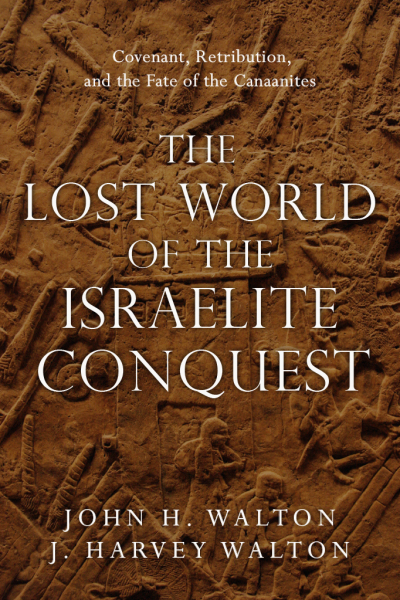Can We Make Sense of the Canaanite Genocide?

John H. Walton and J. Harvey Walton. The Lost World of the Israelite Conquest. InterVarsity Press, 2017.
Some folks will likely be drawn to The Lost World of the Israelite Conquest (henceforth LWIC) because of name-brand recognition: this is the fourth installment in John Walton's popular Lost World series. (However, in this case, the book is largely written by Walton's son, J. Harvey, with John Walton offering editorial input throughout.)
Other people will be drawn to the book because they are troubled by the ethics of the genocide of the Canaanites. In the last fifteen years, the problem of biblical violence generally and the ethics of the Canaanite genocide, in particular, have exploded like a brush fire on a tinder-dry field. Atheists and skeptics have fanned the flames even as apologists and Bible scholars have rolled out the fire hoses.
The Lost World series is distinguished for its focus on understanding the ancient biblical texts in their ancient context, and LWIC applies that focus to the Canaanite genocide. The book consists of six parts consisting of 21 chapters, each one devoted to defending a specific proposition to the end of understanding these difficult texts in their original context.
A Brief Summary
Walton and Walton begin by deconstructing some popular apologetic defenses of these passages. For example, the Canaanite genocide has often been defended by Christian apologists due to the unique sinfulness of this culture. (See, for example, my critiques of William Lane Craig and of Clay Jones on this point.) On the contrary, Walton and Walton argue that the Canaanites are not depicted in the texts as being especially sinful. Nor are they judged for failing to recognize and follow Israel's covenant with Yahweh since they are not a part of that covenant.
If we are to understand these passages, we instead need to enter into the ancient thoughtforms in which they were written. It turns out that the literary depiction of the Canaanites dwelling in the land conforms to an ancient near eastern literary trope of "invincible barbarians destined to be destroyed by the gods." (144) In this trope, the barbarians do not become savage: rather, it is part of their nature as "destructive, subhuman monsters." (147) Thus, it is misguided to attempt to impugn the Canaanites as uniquely wicked; instead, we need to recognize that they provide a "negative example and a foil of the ideal of the covenant order." (156) In addition, the conquest harkens back to the defeat of chaos in the creation narrative (proposition 14).
In part 4 Walton and Walton turn to the much-debated term herem. They reject the common interpretation of herem as "utterly destroy". Though the act can include destruction, the essence of the concept of herem is to remove from use. One application of the herem can apply when a foreign presence threatens the organic unity and health of the body, including the body of society:
"If the cells in, say, your eye have cancer, then you have cancer. The entire corporate entity of you is sick as long as your eye remains both cancerous and attached to you. [...] In order to make you healthy, it is necessary to kill or remove the cancerous cells...." (183)
As treatment of cancer is undertaken to secure the health of the organism, so the herem is undertaken to secure the health of the society: "the purpose of the herem is to remove a community identity from use, not to kill individual people." (190) And thus, the herem is declared against the Canaanites to remove their corrupting identity from the land so as to protect the spiritual purity of the Israelites and secure their faithfulness in carrying out their covenant.
So what do Christians do with this account? While the church recapitulates Israel (236), that does not mean repeating Israel's actions. In short, the occupation of Canaan can never be used to justify violence against others. Rather, the church properly appropriates these texts by spiritualizing them: for example, we place our old sinful self under the herem (Rom. 6:6) so as to secure our own spiritual purity in faithfully carrying out our covenant.
General Impressions
LWIC is packed with astute insights. I particularly found the analyses of the concepts of herem and kadosh (holy) to be helpful. I also appreciated the critique of apologetic attempts to demonize the Canaanites and Walton and Walton's clear exposition of Israel's relationship to Yahweh as modeled on the relationship of vassal to suzerain.
Having said that, at points, the gems need to be extracted from the bedrock of abstruse prose. This is particularly the case early on in the book (e.g. pp. 50-63). As arcane transliterated terms and obscure references proliferate, the lay reader will likely find themselves skimming the pages. In short, sections of the book read more like research notes prior to the editing and refining process.
Finally, while the analysis of biblical concepts was generally of a high order, the analysis of terms like "humanism" (pp. 21-23) and "progress" (p. 23 ff.) was very poor. For example, humanism is not based on the belief that "human happiness constitutes the highest value..." (p. 21) Rather, it is the view that the human flourishing is the normative standard of value and obligation. Perhaps Walton and Walton have confused humanism with a version of utilitarianism.
The Genocidal Elephant in the Room
As I said at the outset of this review, I suspect most people will read this book for one of two reasons: either they are already familiar with the Lost World series and want more of the same or they are looking for help in interpreting the moral horrors of Canaanite genocide.
I suspect readers who have the former concern will be generally satisfied. The situation is rather different for those seeking an ethical framework to understand and appropriate these passages.
To be sure, Walton and Walton do offer a modest insight in their spiritualization of herem. (Their proposal for applying the text to the Christian life reminds me of Origen's spiritualization.) At the same time, Walton and Walton's analysis raises daunting ethical questions which they never address.
We could begin with the fact that they illustrate the herem with the image of cancer: just as uncontrolled cellular growth needs to be cut from the body to retain the health of the organism, so a human population needs to be cut from the land to secure the health of Israel.
Likening a particular ethnic or religious or cultural group to cancer? It's a horrifying analogue, particularly as it calls to mind countless other instances of dehumanizing genocidal rhetoric from the Nazis labeling of Jews as cockroaches to the Hutus calling Tutsis cockroaches. You can talk all you like about the herem of sinful impulses as you follow Christ, but that doesn't change the fact that the text on which those spiritualized appropriations are based dehumanizes an entire population.
I've been referring to this action directed at the Canaanites as genocide throughout this review. But Walton and Walton disagree with this assessment. They make a couple points that I want to address in turn.
To begin with, Walton and Walton assert:
"The idea that the conquest is an act of genocide is based on the assumption that the herem of the Canaanite nations is a command to kill people of a particular ethnicity (derived from Deut 7:2)." (179)
However, the Israelites are not simply killing Canaanite people. Rather, they are seeking to destroy the Canaanite identity. Granted, killing persons may be required to destroy the identity, but the fact remains that the goal is to eliminate the identity rather than persons. And that means, so Walton and Walton believe, that the act is not genocide.
Unfortunately, Walton and Walton have matters completely backwards. It is not the killing of persons which qualifies an event as genocide. Rather, it is the attempt to destroy an ethnic, cultural, or religious identity. (See Article II in the original UN Convention for the Prevention and Punishment of the Crime of Genocide.) Indeed, a genocide can occur without killing a particular person as, for example, by forcibly seizing children and sterilizing mothers.
As a result, when Walton and Walton describe the Israelites as engaged in the herem of cultural identities (175), they are actually providing a textbook example of genocide. I can't help but note the irony that while Walton and Walton are so concerned to understand ancient concepts in context, they show a surprising carelessness and confusion when it comes to understanding the critically important contemporary concept of genocide.
So much for the first defense. Unfortunately, if anything, Walton and Walton's second defense against the genocide charge is even worse. They write:
"When we translate the event as holy war or jihad or genocide, or even conquest, we are not translating the event properly, because those words and ideas do not mean the same thing to us that the logic and imagery used to describe the conquest would have meant to the original audience, either in terms of their connotations or their objectives. When we hear words such as genocide we interpret them as 'a thing that should never be done.' But the text does not depict the conquest event in terms of a thing that should never be done." (257)
I'm sorry, but the reasoning here is stunningly bad. To begin with, Walton and Walton conflate a moral evaluation of the concept of genocide (i.e. it is "a thing that should never be done") with the concept of genocide itself (as defined in Article II which I link to above).
Furthermore, it should be obvious that the moral evaluation genocidaires provide for their own actions does not qualify in the assessment of whether those actions constitute genocide. No doubt the Nazis would justify their actions as a means to secure the purity of the German people just as the ancient Israelites would justify their actions as a means to secure the purity of their people. In neither case do we grant those apologetic defenses any merit in assessing whether the actions in question are genocide or not.
Unfortunately, LWIC has other examples of this poor reasoning (see, for example, page 11). I must conclude that while Walton and Walton are fine biblical scholars, they are far less reliable when they venture far outside their area of expertise.
These confused comments on genocide illustrate the general problem with LWIC. While the book offers many important insights for understanding the ancient context of the conquest narratives, it provides almost no respite or illumination for the ethically troubled reader.
I am reminded here of C.S. Lewis' famous attempt to spiritualize the imprecatory psalmist's vision of smashing Babylonian babies against the rocks (Ps. 137:9). As Lewis has it, if we think of those babies as sinful impulses we too should smash them against the rocks.
I know that Lewis meant well, but that proposal is profoundly offensive. Spiritualizing an ethically horrifying text is simply a recipe for cognitive dissonance. To illustrate, imagine the offense if one would defend an account of raping a woman by allegorizing the text. If that notion offends our senses — and it damn well should — then why would we think it ethically sensible to spiritualize an account of murdering infants?
The question that I pose to Lewis can be posed to Walton and Walton as well. And their utter failure to answer it is the Achilles heel of this book.





















